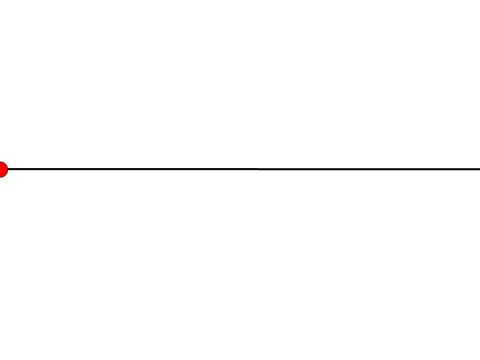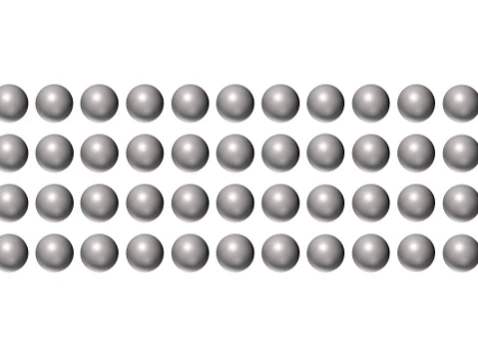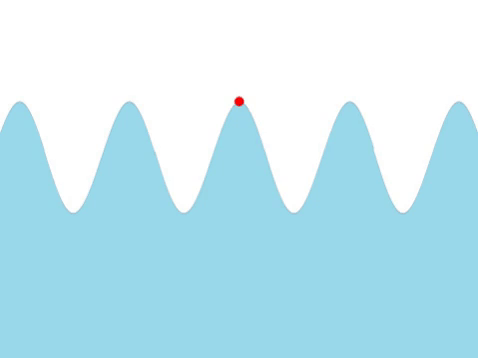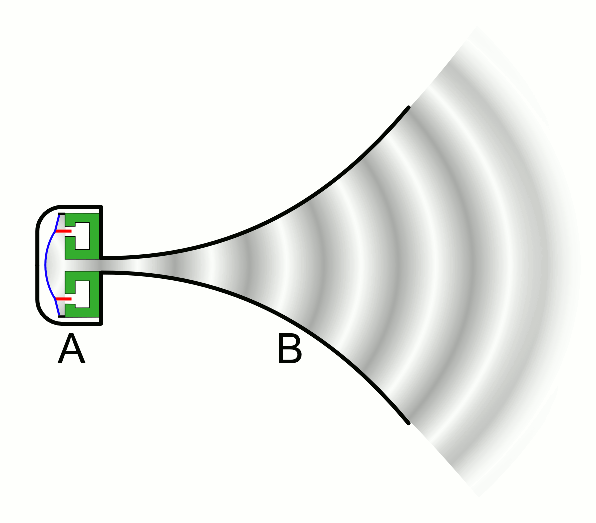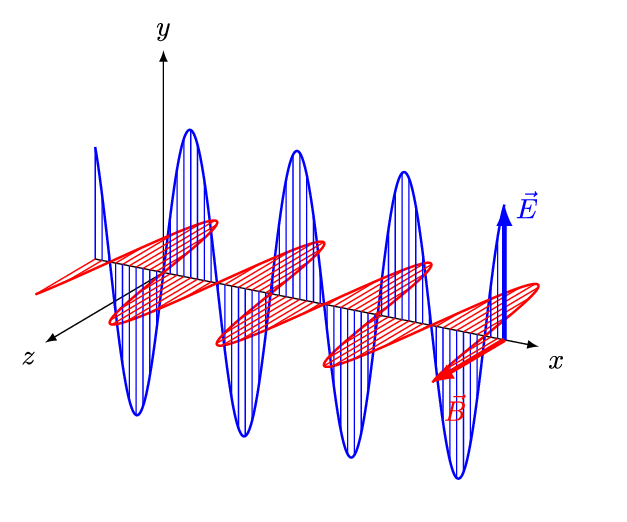Key Stage 3
Meaning
A wave is a vibration that transfers energy from one location to another.
About Waves
- Waves can transmit energy and information from one place to another.
- Waves travel through a medium that allows the vibration.
When a wave meets a boundary between two materials it can be:
- There are two types of wave; transverse and longitudinal.
- In longitudinal waves the vibration is in the same direction as the energy transfer.
- In transverse waves the vibration is perpendicular to the direction as the energy transfer.
Examples
| Water Waves
|
|
|
| A water wave appears as a transverse from the surface.
|
| Sound Waves
|
|
|
| Sound waves are longitudinal waves of compression.
|
References
AQA
- Waves, page 181, GCSE Physics, Hodder, AQA
- Waves, page 219, GCSE Combined Science; The Revision Guide, CGP, AQA
- Waves, pages 187-190, GCSE Combined Science Trilogy; Physics, CGP, AQA
- Waves, pages 190-237, GCSE Physics; Student Book, Collins, AQA
- Waves, pages 224-227, GCSE Physics; The Complete 9-1 Course for AQA, CGP, AQA
- Waves, pages 73-90, GCSE Physics; The Revision Guide, CGP, AQA
Edexcel
- Waves, page 164, GCSE Combined Science; The Revision Guide, CGP, Edexcel
- Waves, page 32, GCSE Physics; The Revision Guide, CGP, Edexcel
- Waves, pages 48-49, GCSE Physics, Pearson Edexcel
- Waves, pages 88-110, GCSE Physics, CGP, Edexcel
- Waves; absorbed, page 56, GCSE Physics, Pearson Edexcel
- Waves; absorption, page 98, GCSE Physics, CGP, Edexcel
- Waves; crossing boundaries, pages 56-57, GCSE Physics, Pearson Edexcel
- Waves; dangers of EM waves, page 136, GCSE Physics, CGP, Edexcel
- Waves; infrasound, page 109, GCSE Physics, CGP, Edexcel
- Waves; longitudinal, page 58, GCSE Physics, Pearson Edexcel
- Waves; longitudinal, pages 88, 89, GCSE Physics, CGP, Edexcel
- Waves; reflection, pages 98, 115, 116, GCSE Physics, CGP, Edexcel
- Waves; refraction, pages 98-102, GCSE Physics, CGP, Edexcel
- Waves; seismic waves, pages 109, 11, GCSE Physics, CGP, Edexcel
- Waves; seismic, page 37, GCSE Physics; The Revision Guide, CGP, Edexcel
- Waves; sound, page 35, GCSE Physics; The Revision Guide, CGP, Edexcel
- Waves; sound, pages 95, 103, 104, GCSE Physics, CGP, Edexcel
- Waves; speed, pages 50-51, GCSE Physics, Pearson Edexcel
- Waves; speed, pages 93-97, GCSE Physics, CGP, Edexcel
- Waves; transmission, page 98, GCSE Physics, CGP, Edexcel
- Waves; transmitted, page 56, GCSE Physics, Pearson Edexcel
- Waves; transverse, page 58, GCSE Physics, Pearson Edexcel
- Waves; transverse, page 88, GCSE Physics, CGP, Edexcel
- Waves; ultrasound, pages 106-108, GCSE Physics, CGP, Edexcel
- Waves; velocity, pages 164-66, GCSE Combined Science; The Revision Guide, CGP, Edexcel
- Waves; velocity, pages 32-36, GCSE Physics; The Revision Guide, CGP, Edexcel
- Waves; wavefronts, pages 90, 101, 102, GCSE Physics, CGP, Edexcel
- Waves; wavelength, page 91, GCSE Physics, CGP, Edexcel
OCR
- Waves, page 142-165, Gateway GCSE Physics, Oxford, OCR
- Waves, pages 186-194, Gateway GCSE Combined Science; The Revision Guide, CGP, OCR
- Waves; Behaviour of, pages 142-149, Gateway GCSE Physics, Oxford, OCR
- Waves; Electromagnetic waves, pages 142, 152-159, 242, 264-265, Gateway GCSE Physics, Oxford, OCR
- Waves; Frequency, pages 153, 256-257, Gateway GCSE Physics, Oxford, OCR
- Waves; Interactions, pages 162-165, Gateway GCSE Physics, Oxford, OCR
- Waves; Lenses, pages 162-163, Gateway GCSE Physics, Oxford, OCR
- Waves; Light and colour, pages 164-165, Gateway GCSE Physics, Oxford, OCR
- Waves; longitudinal, page 186, Gateway GCSE Combined Science; The Revision Guide, CGP, OCR
- Waves; longitudinal, pages 59, 64, 101, Gateway GCSE Physics; The Revision Guide, CGP, OCR
- Waves; Mechanical waves, pages 142, Gateway GCSE Physics, Oxford, OCR
- Waves; Models of, pages 143, Gateway GCSE Physics, Oxford, OCR
- Waves; pages 59-72, Gateway GCSE Physics; The Revision Guide, CGP, OCR
- Waves; pages 59-72, Gateway GCSE Physics; The Revision Guide, CGP, OCR
- Waves; Period, pages 142-143, Gateway GCSE Physics, Oxford, OCR
- Waves; reflection, page 189, Gateway GCSE Combined Science; The Revision Guide, CGP, OCR
- Waves; reflection, pages 61, 62, 64, 65, Gateway GCSE Physics; The Revision Guide, CGP, OCR
- Waves; refraction, pages 190, 191, Gateway GCSE Combined Science; The Revision Guide, CGP, OCR
- Waves; refraction, pages 61, 63, 64, Gateway GCSE Physics; The Revision Guide, CGP, OCR
- Waves; Seismic waves, pages 244-245, 256, Gateway GCSE Physics, Oxford, OCR
- Waves; Sound waves, pages 142, 145-149, Gateway GCSE Physics, Oxford, OCR
- Waves; sound, page 187, Gateway GCSE Combined Science; The Revision Guide, CGP, OCR
- Waves; sound, pages 59, 60, 64, Gateway GCSE Physics; The Revision Guide, CGP, OCR
- Waves; Speed, pages 144-145, 256-257, Gateway GCSE Physics, Oxford, OCR
- Waves; transverse, pages 186, 192, Gateway GCSE Combined Science; The Revision Guide, CGP, OCR
- Waves; transverse, pages 59, 66, 101, Gateway GCSE Physics; The Revision Guide, CGP, OCR
- Waves; Velocity, pages 144-145, 256-257, Gateway GCSE Physics, Oxford, OCR
- Waves; water ripples, page 188, Gateway GCSE Combined Science; The Revision Guide, CGP, OCR
- Waves; Wavelength, pages 142-144, 153, 256, Gateway GCSE Physics, Oxford, OCR
